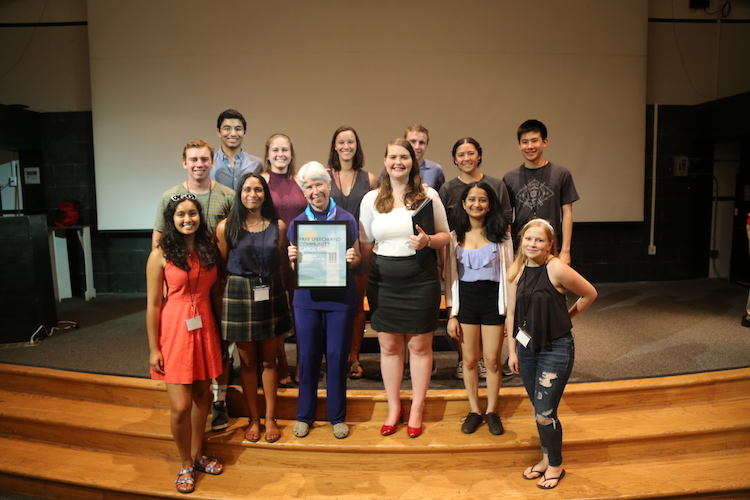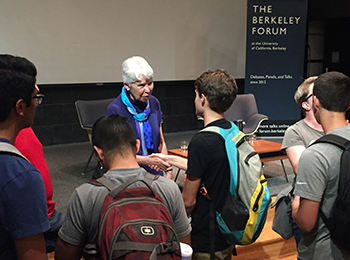Carol Christ addresses free speech tensions at Berkeley Forum
The event was part of the campus's Free Speech Year, which celebrates Berkeley's historical ties to the issue and examines its treatment today

September 1, 2017
UC Berkeley Chancellor Carol Christ kicked off the campus’s Free Speech Year on Thursday with an address at the Berkeley Forum, a student-run organization that hosts discussions and debates with major public figures.
The event was framed as an opportunity for the Berkeley administration to address the tensions that come with championing unfettered free speech alongside a stated desire to build a more inclusive campus community. Several right-wing speakers invited to speak at Berkeley in recent months espouse viewpoints that are seen as antithetical to campus principles of diversity, tolerance, and inclusion.

Chancellor Christ speaks with Berkeley Forum moderator Shaina Zuber.
Christ began her address to the audience of about one hundred students and community members with an overview of UC Berkeley’s legal obligations in the realm of free speech, paying particular attention to the rights of speakers invited to campus by student groups. Even if an invited speaker’s opinions are abhorrent, Christ said, his or her speech is almost always legally protected.
“The United States offers greater protection to free speech than any other liberal democracy,” Christ said. “Laws controlling hate speech exist in Canada, New Zealand, the United Kingdom, Denmark and Germany…They don’t exist here.”
Christ noted that the Constitution guarantees absolute freedom of speech, placing the burden on the state to demonstrate whether there are any circumstances that justify its limitation. The relevant established exceptions, she said, occur when speech presents an immediate threat of physical harm; is likely to produce an immediate violent response (though she noted that courts are reluctant to impose this standard); or meets a very specific definition of harassment aimed at an individual. None of these standards have been met by speakers invited to the Berkeley campus in recent months.
“If a speaker has been invited in accordance with our policies,” Christ concluded, “we cannot legally deny that person the opportunity to speak on the basis of his or her opinions, no matter how loathsome we find them.”
Beyond the campus’s legal responsibilities, Christ noted that bringing in speakers with all manner of perspectives is generally something that the institution holds dear. “I believe it is critical for us as a country and for us as a campus to learn how to have conversations across difference,” she said.
Still, Christ noted that supporting the rights of all kinds of speakers can conflict with campus values.
“Speech that denigrates groups — blacks, Jews, lesbians, gays, and transgender people, immigrants, Muslims, women, to give just a few examples — is loathsome and odious. It violates our values as a nation, as a university, and as a community…It reinforces a history and culture of discrimination and prejudice, and it inflicts emotional harm.”
She said that the best response to such reprehensible speech is often to fight back by debating it.

Chancellor Christ speaks with students following the event.
“We should do everything we can to call it out for what it is, to show its toxicity and hatefulness,” Christ said. She referenced the philosopher John Stuart Mill, noting that “truth is of such power that it will always prevail.”
Through a series of anecdotes, Christ illustrated the power of non-violent protests such as walkouts, counter-events and mockery to challenge hateful speech. She also noted the importance of finding solidarity with like-minded individuals for support and — reflecting on her many years as one of a few female faculty members in a male-dominated work environment — acknowledged the need to cultivate “inner resilience.”
Christ advised against using the “heckler’s veto” or other forms of platform denial to prohibit a speaker from delivering his or her message, stating that “once you start down the path of de facto censorship…you set up the culture and conditions in which your own rights of speech can be compromised.”
In the event’s question and answer period, Christ offered some final thoughts acknowledging the complexity of free speech issues and referencing the many events — lectures, forums, debates, conferences, meetings between campus political groups and more — that Berkeley will host to explore the topic throughout the upcoming Free Speech Year.
“In thinking deeply about this issue over the past several months, I have become convinced that understanding free speech doesn’t come from a simple declaration,” she said. “It is a process of engagement.”